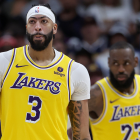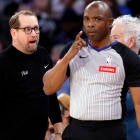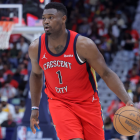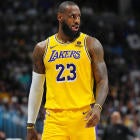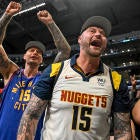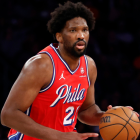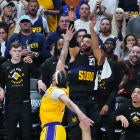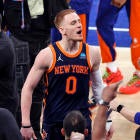Before the FIBA World Cup began, a matchup between Team USA and France would have been treated as a potential, perhaps even likely, gold medal game. Team USA is, obviously, FIBA's No. 1 ranked team, but France is No. 3. They won bronze at the last World Cup in 2014, beat Spain to win gold at Eurobasket 2013 and even came within three points of taking down a much stronger Team USA at the 2016 Olympics.
That kind of opponent is far more daunting than anything Team USA has faced so far. The sort of offensive lethargy that worse countries have allowed for will not be tolerated by France. So ahead of Wednesday's quarterfinal matchup, let's dive into this matchup, what makes the French team tick, and how they will attack Team USA specifically.
So who do they have?
The French national team is led by three fairly big NBA names: Rudy Gobert, Evan Fournier and Nicolas Batum. That threesome, along with Tony Parker, made up the core of the French roster during its heyday in the mid-2000s. This is their first major international competition without Parker, but fortunately, they have plenty of other NBA talent populating their roster.
Their starting point guard is New York Knicks point guard Frank Ntilikina, who is far more comfortable playing within FIBA's more structured game than he is in the NBA. Their top reserve and second-leading scorer is former San Antonio Spurs wing Nando de Colo, and their backup center is incoming Boston Celtic Vincent Poirier. Even the non-NBA players have made real impacts. Starting power forward Amath M'Baye is shooting over 65 percent from the field in this tournament. No team can match the raw talent of this American roster, but France comes closer than just about anyone else in the field.
What kind of offense do they run?
Pick-and-roll is this team's bread and butter, but they don't run it in the sense that most NBA teams do. When Russell Westbrook runs a pick-and-roll, he's trying to use his big man as a conduit to the basket. But France's ball-handlers aren't elite finishers at the rim. Ntilikina specifically uses his screens as springboards into open floaters and mid-range jumpers.
Batum, de Colo and Fournier are a bit more diverse, but France is largely a jump-shooting team. They are able to play that way largely because of Gobert's gravity. He is shooting 73.1 percent from the field in this tournament, as France's ball-handlers look for him on skip passes and the occasional lob.
Defenses sag to protect against Gobert's dunks, and while it has limited him to only 5.2 shot attempts per game, it has had a staggering impact on the rest of the French offense. France is shooting a staggering 47.4 percent from three-point range in this tournament. Seven players on this team have attempted double-digit three-point attempts, and six of them are above 40 percent in the tournament. That includes Ntilikina, who shot 28.7 percent on three-pointers last season.
But their best player, by far, has been Fournier. French coach Vincent Collet has slotted Fournier into a lot of the off-ball motion plays that Parker used to run to perfection.
That loop is straight out of San Antonio's playbook, and even the fallaway jumper looks like Parker. The goal, in many of these actions, is to get Fournier the ball in motion. France runs plenty of pindowns and dribble handoffs for Fournier to give him the ball with momentum.
But more than any other player on the roster, Fournier has the green light to do just about whatever he wants with the ball. He is the only French player to isolate with much consistency, and as the tournament's fifth-leading scorer, it's not hard to see why. He is averaging 20.8 points per game in the World Cup, and limiting him is essential to beating France.
Do they play good defense?
The first thing you'll notice when watching France? This team is big. Really big. It starts at the head of the defense with 6'6'' point guard Frank Ntilikina and ends at the rim with Rudy Gobert and his 7'9'' wingspan. With so much length, France gets into passing lanes practically by default.
Gobert's length affords the French defense liberties most teams don't have defensively. Their perimeter players, due in large part to the chemistry built by playing together for years, are able to switch discriminately off of the ball based on the matchup, though it is more of a luxury than a pillar of their system. They can apply strong ball pressure knowing that one of the best rim-protectors on Earth has their back.
In this play, remember that Ntilkina is guarding Patty Mills, the tournament's third-leading scorer and a career 39.1 percent three-point shooter. He gets in his face well behind the arc knowing that even if he's beaten, he has Gobert behind.
But Gobert hasn't been perfect in the World Cup, and that is due in large part to the kinds of teams he has had to play against. Playing center in the modern NBA means protecting the rim against driving guards. In international play, however, it means bodying up against low-post scorers, most of whom have more bulk than Gobert does. That has gotten him into foul trouble on a few occasions. Which dovetails nicely into how he'll match up against the United States specifically.
How do they match up with Team USA specifically?
Team USA doesn't have the sort of low-post big man that has given Gobert trouble in this tournament. In fact, they have the opposite sort of roster. Their best lineups have lacked a center entirely, but that extreme has given Gobert trouble as well. The Houston Rockets have used such lineups to perfection in the past two postseasons in order to force Gobert away from the basket. That is critical under FIBA rules, as there is no three-in-the-key rule. If Gobert can camp out at the basket, Team USA is essentially cut off from easy baskets, so expect lineups to heavily feature shooting in this one.
The matchup to watch is going to be Ntilikina against Kemba Walker. Walker is not only a captain and Team USA's leading scorer at 14.6 points per game, but he is their go-to option in crunch time. When Team USA needed offense to stay alive against Turkey, he generated it, but he has not faced a defender like Ntilikina yet in this tournament.
Walker has struggled in six NBA games against Ntilikina, averaging 18.7 points on 41 percent shooting from the field compared to 23.9 points on 43.3 overall over the past two years. Ntilkina is obviously not the only player responsible for those numbers, as he played only 20 minutes per game in those matchups, but it's worth remembering that Walker is only listed at 6'1''. Ntilikina's size is a problem, and if he swallows up Walker, Team USA is going to have to look elsewhere for offense.
Team USA should be favored in this game. They have more talent, and their overall numbers in the tournament have been better. But this could well be the most difficult test they face in this tournament, especially now that Serbia has been eliminated. Expect a close game in this one.














